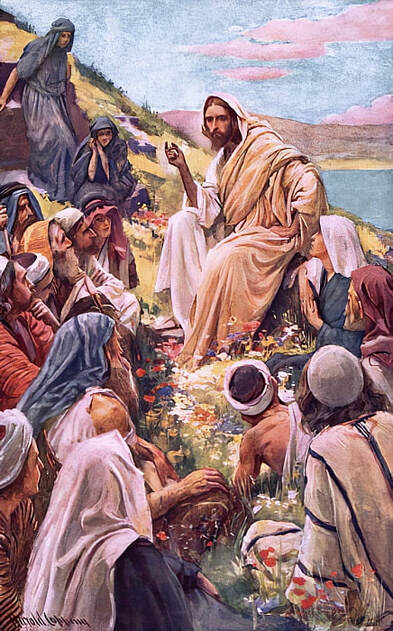|
By the Reverend Jon Stratton Father Stratton shared this sermon with us for our February 28, 2021, Zoom service. "Make it plain preacher, make it plain!" If you have a background in the Black Church tradition, or a Pentecostal denomination, or maybe even an evangelical or Baptist congregation, you might have heard the refrain to "make it plain" shout from the pews during a Sunday morning sermon. "Make it plain, preacher, make it plain." That’s not so much a request as it is an affirmation. An affirmation that the preacher has stepped away from mile-high theology, wrapped up the complicated Greek word study, and closed the books on the exegetical inquiry, and, perhaps finally, started speaking the clear, plain truth in a language that the people can understand. "Make it plain." When a preacher hears that, she knows she’s on the right track. She knows the message is sinking in. She knows that she’s not wasting anyone’s time with hemming and hawing or mealy-mouthed jawing. She might not be speaking a comfortable word - often she’s not - but she knows what’s coming out of her mouth is a clear, straightforward, and necessary word that the people need to hear. You might think of “make it plain, preacher,” as kind of the opposite of “Lord help 'em.” That’s the refrain that you most certainly do not want to hear while standing in the pulpit. I like to think that the people of Galilee practiced call and response preaching. And if they did, Jesus surely heard, "Make it plain, preacher!" on several occasions. When Jesus said the lives of poor people matter, I imagine somebody shouting, "Make it plain, preacher." When Jesus said how hard it is for rich men to enter the kingdom, I imagined somebody shouting, "Make it plain, preacher." When Jesus said do unto others as you would have them do unto you, I imagine somebody shouting, "Make it plain, preacher." When Jesus said whatever you do for the least of these you do for me, I imagine somebody shouting, "Make it plain, preacher." It’s true, Jesus didn’t always make it plain. Sometimes, he was downright confusing. But that’s not the case this morning. As Jesus and his friends are walking down the road to Jerusalem, Jesus makes it plain. He says, “Fellas, listen up, I’m going to die. When we get to the big city, the religious leaders, and the intellectual elite, and the decision makers are all going to conspire together and murder me. And they will succeed. I’m not saying this might happen. I’m saying this must happen. It must happen because power concedes nothing without a costly demand. I’m going to die. And if you want to follow me, you need to be willing to do the same.”
If you were to take a couple of minutes this morning, to do some self-reflection, I’d be willing to bet that you could identify a moment or two when Jesus made it plain, and you, like Peter, felt some pain. Like when a loved one made it plain that you needed to make a change. Or when a friend made it plain about an addiction. Or a partner made it plain about a broken relationship. Or a counselor made it plain about an unhealthy and ignored behavior or issue. And in the moment, when Jesus made it plain to you, it probably wasn’t easy. You probably didn’t want to hear about the crosses, the sacrifices, and the struggles that must precede your salvation. You might have even done a little rebuking. But hopefully, upon reflection, you see, like Peter eventually would, that making it plain and gaining some clarity about the difficult road to Jerusalem is a necessary step toward healing, forgiveness, wholeness, and resurrection, and that ignoring your crosses doesn’t make them go away. Which makes this morning’s passage full of Good News. The Good News that Jesus loves us enough to make it plain, even when we’d rather not listen, because Jesus knows that our salvation depends on it. And not just our personal salvation, but also our communal salvation and our national salvation. Jesus makes it plain, not because the Galilean preacher wants to scare us, but because the Galilean preacher wants to save us. Last year in particular, I feel like Jesus spent a whole lot of time making it plain to America. Jesus made it plain that our road to salvation includes a confrontation with white supremacy. Jesus made it plain that our road to resurrection includes a confrontation with health disparity. Jesus made it plain that our road to redemption includes a confrontation with an economic system that rewards a few at the expense of the many. Jesus made it plain that our journey to Jerusalem ain’t going to be easy, because, to paraphrase Frederick Douglass, “power concedes nothing without a demand, power concedes nothing without agitation, power concedes nothing without a struggle.” And although making it plain can cause some pain, Jesus’ Calvary-shaped clarity is necessary for our salvation. The question is, when Jesus makes it plain, will we rebuke or will we follow the Galilean preacher to the cross that points to resurrection. AMEN The Reverend Jon Stratton serves as Rector at Trinity Episcopal Church in St. Louis' Central West End.
1 Comment
Don Davies
4/24/2022 06:21:27 pm
Beautiful sermon. I really follow and love your church service and I really put it in high regard along with the black gospel preaching of Keion Henderson https://www.keionhenderson.com/about-us/ , who has also been supportive of our community!
Reply
Leave a Reply. |
Editorial contactVarious members of the St. John's congregation contribute to this blog. For editorial suggestions, contact Jeff McIntire-Strasburg at [email protected] Archives
May 2024
CategoriesAll Bishop Deon Johnson Book Group Congregation Members Deacons Diocese Of Missouri Episcopal Church Features General Information Parish Events Podcast Presiding-bishop-michael-curry Sermons Terms-of-transition Vestry |

 RSS Feed
RSS Feed

